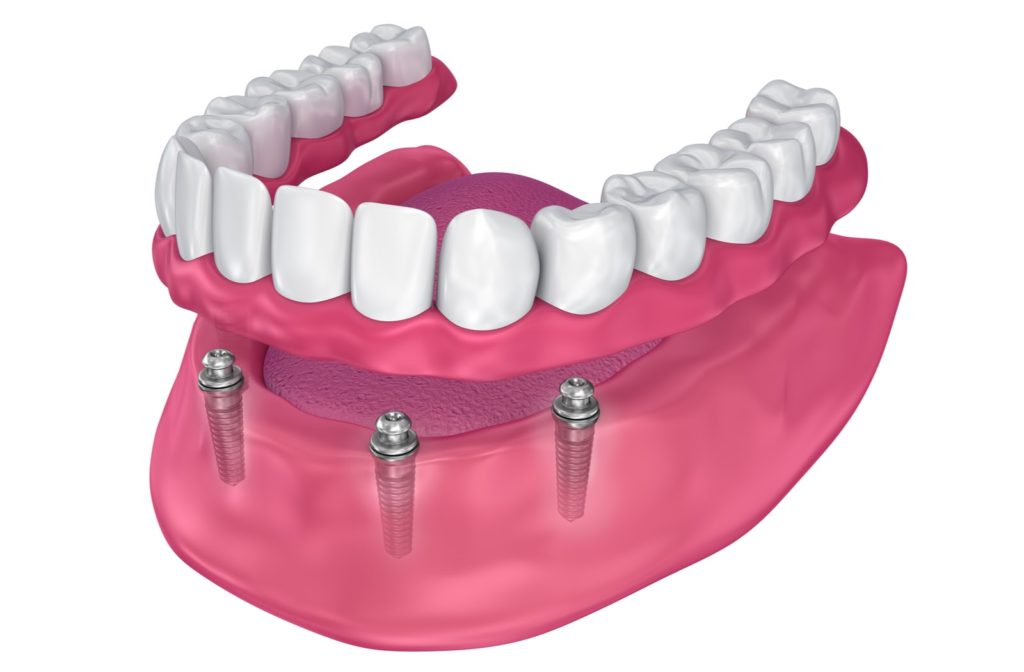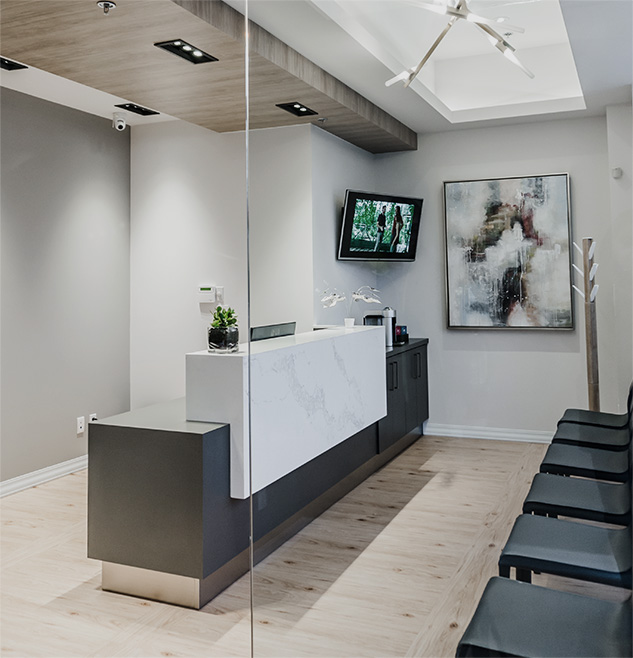For people who have lost most or all of their teeth, overdentures are a natural-looking replacement with some health and aesthetic advantages over conventional dentures.
Overdentures can be a particularly enticing option for patients who found conventional dentures impractical or felt they interfered with their speech or eating. We offer custom-made dentures to fit your mouth and support your overall health.
What Are Overdentures?
Dentures, as you may know, are custom-crafted artificial teeth. They can be partials, which replace several lost teeth, or complete dentures, which take the place of all the top or bottom teeth and are held in place primarily by suction.
Overdentures, also called implant-supported dentures or snap-on/snap-in dentures, are attached to dental implants that have been surgically implanted into the jaw bone. The implants protrude from the gums and the removable overdentures snap into them, forming a stable set of false teeth.
Advantages of Overdentures
Comfortable & Natural-Looking
While it may take a little while for you to get used to wearing overdentures, they generally don’t have the same fit concerns as conventional dentures, because they’re securely attached to your implants.
In contrast, some people have difficulty speaking normally with conventional dentures, or find they slip around.
Supports Good Nutrition
Malnutrition is a serious concern for people who are missing many teeth, particularly older adults. People who are missing teeth, even if they wear conventional dentures, may not enjoy food like they used to.
Overdentures can be a more comfortable replacement for teeth, with fewer compromises when it comes to eating. One study suggests this is thanks to both how well the overdentures function, and the wearer’s increased confidence in social dining settings.
In comparison, people who wear traditional dentures may need to avoid or use caution when eating certain foods, including raw vegetables, crunchy fruit, crusty bread, nuts, popcorn, and tough cuts of meat.
Supports Jaw Health, Function, & Looks
Even one or two missing teeth can cause your face to change shape. For people who are missing all of their top or bottom teeth, this can result in a sunken look to their mouth related to jawbone and gum changes.
That collapsed mouth look can happen even with conventional dentures. But implant dentures, because the implants are directly integrated into the jawbone, can prevent that bone loss.
Straightforward Maintenance
Overdentures take just a little bit more care than natural teeth. The Canadian Dental Association recommends the following steps:
- Gently brush your implants after each meal, or at least twice a day, including flossing or wiping them
- Brush your tongue and gums regularly
- Use a mouth rinse if desired and if your dentist agrees
- Regularly check your dentures to ensure they’re clean
- Brush your dentures with a soft toothbrush daily
- Remove your dentures overnight and let them soak in water or a denture solution
Lasting Solution
The longevity of dentures relies on good oral hygiene of your implants, your mouth, and your dentures. Most dental implants last at least 5 years, while most dentures last at least 5 to 10 years.
Regular dental exams are an important part of keeping your mouth healthy. They allow your dentist to identify small problems before they become big ones.

Drawbacks of Overdentures
Overdentures may not be the right solution for every person who is missing all of their teeth. Here are some of the factors you may want to consider when it comes to overdentures.
Implants Require Healthy Gums & Bone
The dental implants used for overdentures require healthy gums and bones for success. That means any gum disease must be fully treated before surgery.
Patients with uncontrolled diabetes may not be good candidates for dental implants due to concerns with infection and healing.
Smoking can drastically increase the chances of your dental implants failing. Your dentist can explain the benefits of quitting smoking in your particular situation.
The Process Takes Several Months
It could take up to about 6 months from the beginning of treatment to be able to start wearing your custom overdentures. Dental implants often require 2 surgeries to complete, including time for the bone and gums to heal.
Conventional dentures can often be placed in about 8 to 12 weeks.
The time and effort for overdentures can seem like a lot for some people, but it’s important to consider the aforementioned advantages, too.
The Cost May Not Be Fully Covered By Your Insurance
The upfront cost of overdentures, which will vary based on your particular needs, could be prohibitive for some patients. For low-income seniors in Ontario, OHIP may provide coverage for certain procedures.
Discuss Your Smile With Us
We understand that making decisions about your oral health, especially when you’re missing teeth, can be an overwhelming topic. We’d love to help you feel more confident in making those decisions.
Book an appointment with us and let us recommend a treatment plan for your healthy smile.







